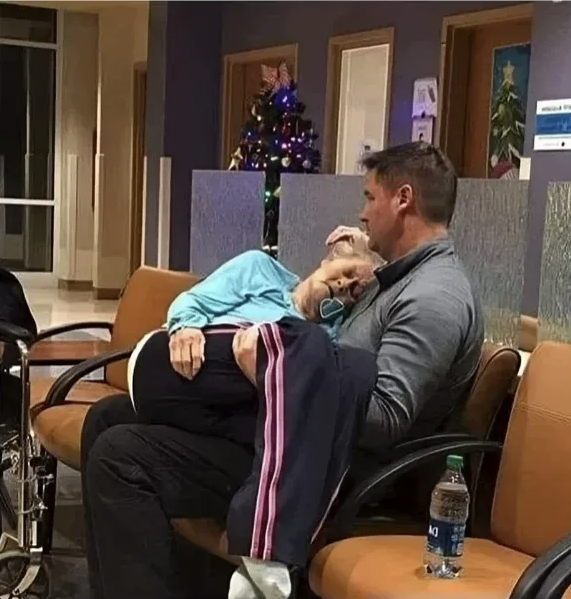
The waiting room was quiet except for the hum of fluorescent lights and the distant sound of a television playing holiday music. Christmas decorations hung in the corners—a small tree with twinkling lights, paper snowflakes taped to the windows. It was the kind of place where people wait for news about the people they love, where time moves differently and every minute feels longer than it should.
In the middle of it all, a man sat cradling his elderly mother in his arms. She was small now, fragile in a way she never was when he was young. Her head rested against his chest, her body curled into his embrace with complete trust. She looked peaceful, safe, her eyes closed as if she might drift off to sleep right there in the hospital chair.
He held her the way she once held him—carefully, protectively, with the kind of tenderness that doesn’t require words. His arms wrapped around her shoulders, supporting her weight as easily as if she were a child. And in a way, that’s what this moment was: a beautiful reversal, the circle of life completing itself in the most profound way.
She carried him into this world. Held him when he was too small to hold himself. Fed him, bathed him, stayed up through countless nights when he was sick or scared or simply couldn’t sleep. She was his first teacher, his first protector, the person who showed him what unconditional love looked like before he even knew the words.
Now he was doing the same for her. Holding her through the hard moments. Being strong when her strength was fading. Showing her the same care she once gave him, returning the gift she spent decades giving without ever asking for anything in return.
There’s something achingly beautiful about watching children care for aging parents. It’s not always easy. The roles feel reversed in ways that can be uncomfortable, even painful. The parent who once seemed invincible now needs help with things they used to do without thinking. The child who once needed everything now becomes the caregiver, the decision-maker, the steady presence.
But in the difficulty, there’s also grace. There’s the recognition that love isn’t a one-way street, that care flows both directions across the years. That the mother who held you when you were too weak to stand deserves to be held when she’s too tired to do it herself.
Looking at them, you can see the entire arc of their relationship. You can imagine her holding him as an infant, his tiny body nestled against her the same way she now nestles against him. You can see decades of moments—scraped knees and first days of school, teenage arguments and adult reconciliations, holidays and ordinary Tuesdays, all the small and large ways they’ve loved each other across a lifetime.
This moment in the waiting room is just one more in that long chain. But it’s significant because it shows what so many people struggle to articulate: that caring for aging parents isn’t a burden. It’s a privilege. It’s the chance to say thank you for all the years they spent putting you first. It’s the opportunity to demonstrate that the love they planted in you has grown deep roots.
She feels completely safe in his embrace—just as he once did in hers. That’s the legacy of good parenting. Not that your children never need you, but that when they grow up, they know how to love someone else the way you loved them. That they understand care is something you give because it was given to you.
In a hospital waiting room, beneath flickering Christmas lights, a son holds his mother and completes the circle. She carried him into this world. And now, with the same gentleness she once showed him, he carries her through it.